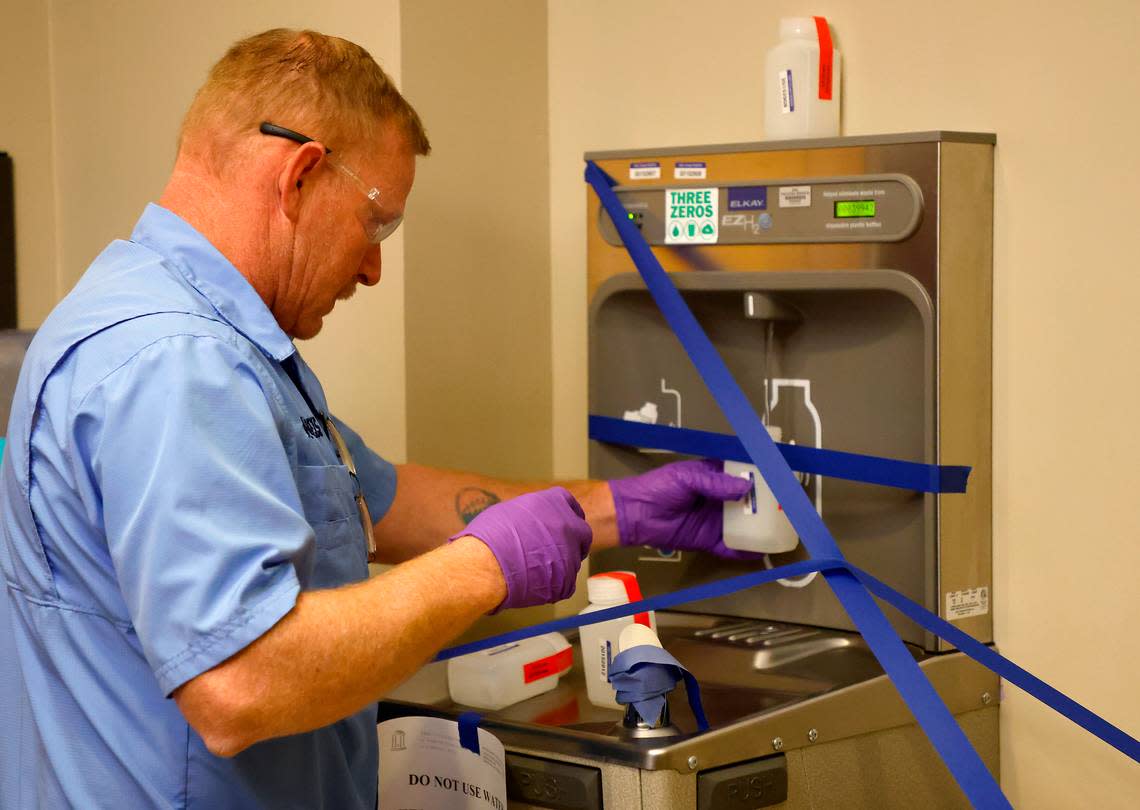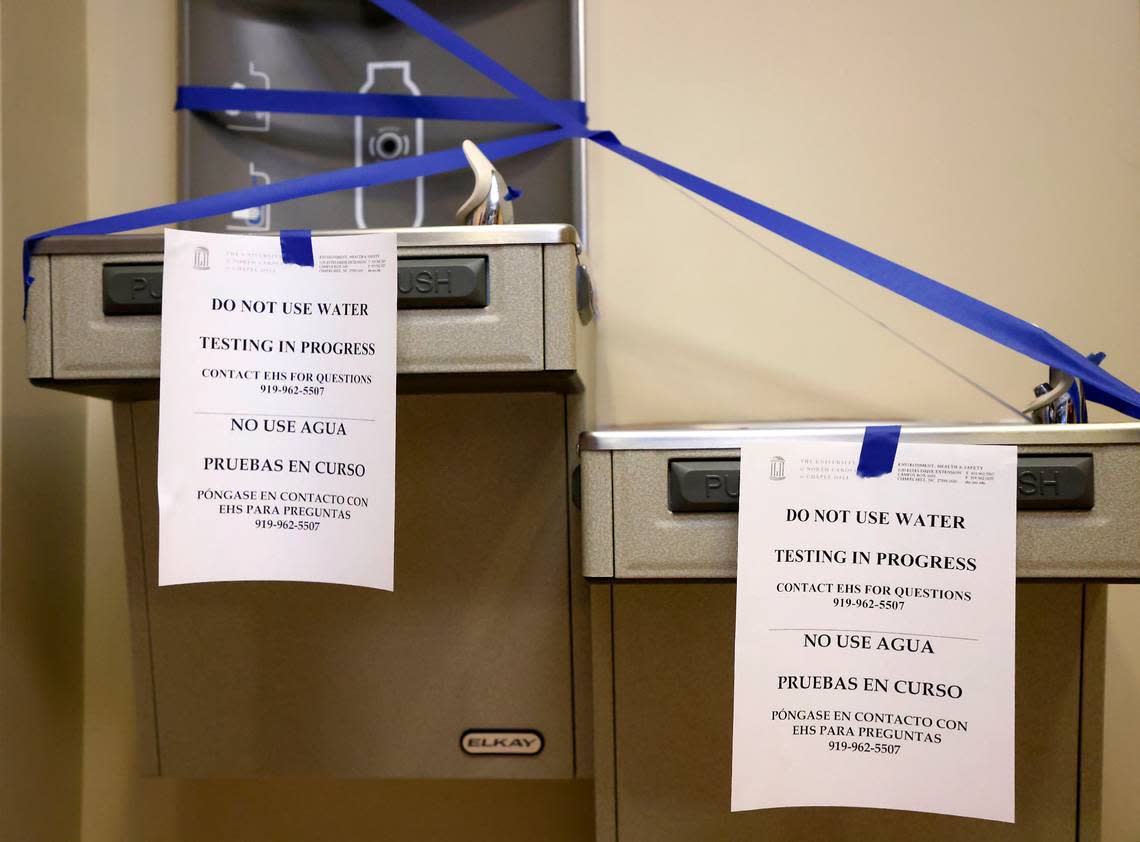Lead found in water at UNC’s Kenan Stadium and Dean Smith Center
Lead was found in dozens of water fixtures at UNC-Chapel Hill’s Kenan Stadium and Dean Smith Center — home to the university’s football and basketball teams, respectively — as part of ongoing testing for the toxic metal in buildings around campus.
Test results posted on the university’s Environment, Health and Safety (EHS) department website last week show that four drinking fountains and 20 sinks in Kenan Stadium were found to have detectable levels of lead in tests performed between Oct. 21-25. The results marked the first time lead has been found in the water of an athletic facility at the university since widespread testing began earlier this semester.
Test results for the Dean Smith Center show that seven fixtures in the building were found to have detectable levels of lead. Five of the fixtures are water fountains, one is a “water dispenser” and one is a sink. The tests were performed on Oct. 31 and Nov. 1.
The results at the Smith Center come just hours before the UNC men’s basketball team opens its season at the arena.
Lead has now been found in water fixtures in more than three dozen university buildings since August.
In other tests completed around the same time as those at Kenan Stadium, lead was also found in water fixtures at the university’s James A. Taylor Building, which houses Campus Health services, and five other buildings, including Old West Residence Hall and Ackland Art Museum.
The university was first made aware of potentially contaminated water by a group of students doing a summer project, who tested for lead in campus water and received positive results. Since then, the university has used a three-phase approach to testing fixtures around campus. The third phase, which targets fixtures in buildings built in or prior to 1990, is ongoing.
Most fixtures in numbered rooms at facilities
At both Kenan Stadium and the Smith Center, most of the affected water fixtures are listed as being in numbered rooms within the facilities.
It is unclear whether fans or visitors to the facilities have access to these rooms. The News & Observer previously reached out to UNC Media Relations for additional information about the fixtures at Kenan Stadium, but has not yet received answers.
Though there is no safe level of exposure to lead, all of the detected levels of lead at the facilities fall below the Environmental Protection Agency’s minimum threshold of when public water systems should take action to reduce the amount of lead in the water. The university is “taking action for any measurable lead.”
Testing at the Smith Center is described as “comprehensive” and “complete” by EHS.
The recent round of tests and results for Kenan Stadium — which are described in a letter to building occupants as “partial,” instead of “comprehensive” — marked the second round of tests performed there this semester. Two drinking fountains in the stadium’s press box were previously tested on Sept. 20, and were not found to have lead.
One affected sink at Kenan Stadium was identified in the test results as being in the stadium’s South Koury Box, which has 180 stadium seats, and another sink was identified as being in the kitchen of “Rams Club Section A.” The Rams Club is a membership-based organization that financially supports athletics at the university, and seats are reserved throughout the stadium and in “premium areas” for members.

The Tar Heels play their next home football game on Nov. 19.
Blood lead testing is available
Unlike public water systems, universities are not required to test campus water regularly, or at all, for lead. Drinking water on the UNC campus has previously been tested by request “if someone believes there is a water quality issue,” The N&O previously reported.
While fixtures are being tested, they are marked with warning signs telling people not to drink from that source. When a water fixture is identified as having detectable levels of lead in the water, the water source is removed from service until the fixture can be fixed, replaced or otherwise remedied, university officials have told The N&O.
In some cases, such as when all of the fixtures in a building are unable to be used due to testing or replacement, the university is providing water coolers for building occupants to use in the meantime.
Lead, even at low levels of exposure and ingestion, is known to cause adverse health effects, especially in children and pregnant women. In adults, the EPA says, lead exposure can lead to cardiovascular effects, increased blood pressure, hypertension, decreased kidney function and reproductive problems in both men and women.
In an interview with The N&O Monday, Rebecca Fry, a distinguished professor in the university’s Department of Environmental Sciences and Engineering, said the risk of lead exposure is “really individualized and depends on a lot of factors,” such as the age of the person exposed, the concentration of lead and the duration of the exposure.

If someone is concerned about possible exposure to lead at either of the athletic facilities or anywhere else, it is advised to seek blood lead level testing.
Health testing is available at no cost to UNC faculty, staff and students who work or study in the affected buildings where lead has been identified.
To access health testing, students and post-doctoral fellows are instructed to contact UNC Campus Health at 919-966-2281. Faculty and staff seeking health testing should contact the University Employee Occupational Health Clinic by phone at 919-966-9119. Non-student and non-employee community members and visitors who have health concerns are instructed to consult with their physicians.
The university has thus far not reported any known adverse health effects or concerning blood lead levels related to the identification of lead on campus, Fry said Monday.
